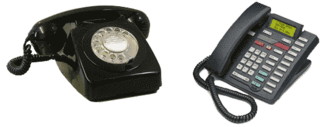Do you Telephone take this PC till death do you part?
I while back I started writing about the combination of a PC's and Telephones. I started thinking more about this as I was designing some telephony integration into a customer relationship product. Here what's in Greg's head on the subject:
- What if every time your phone rings your PC could use the caller ID and look up the contact information, perform a Google search and show me a recent call log.
- What if every time your phone rings your music player knew to pause your music.
- What if I could use a PC interface to decide if I wanted to take a call, put it on hold or transfer it to voice mail?
These are nice ideas but let's think about this... What problem are we solving? In my opinion it's a UI problem with telephones. In general phones come in two flavors:

They either have very few buttons and you are mainly supposed to dial your number, or they have a very large number of buttons, features and options that are likely to prevent you from dialing your number.
In either case the phone is totally isolated from your PC where all your phone numbers are stored. It's isolated from the one device that has a full keyboard and access to a rich and graphical user interface to explain and simplify all your features and options.
On a phone the procedure to store a phone number into memory typically goes something like this: Press Store, Press the memory key where you would like to store your number then dial the number and press Store again to complete the interaction. The process has a beginning middle and end. What you are doing is putting the phone into a special mode to program the buttons. How could you do the interface on a PC? You would find the telephone number in a contacts list or a call log, and then right click and "Create a Shortcut" or drag the phone number to a toolbar and have it create a new button, or mark the number as a favorite. Regardless of how you decided to do it you would not need to put your phone in a special mode. Additionally because multiple techniques are valid you would increase the likelihood that a user would discover one of them.
In addition a PC allows you to demote and promote features. For example your most common functionality can be on a toolbar, in a button, and a menu and in a right click menu but more advanced options and features can be buried away so they don't confuse beginners.
On a PC you could also reuse existing concepts that people already know. For example let's imagine that phone conversations where represented on screen in a similar way to Instant Messenger Windows. If you had multiple windows open this would be multiple conversations. The currently active window would be the current conversation. Switch windows and you've placed one caller on hold and picked up the other one. If you invite someone to join the conversation it dials their phone number. If you close your window it hangs up.
Let's try some scenarios the other way around:
- Every time I see a phone number on my PC I should be able select it and click dial.
- Every time I see a phone number on a website I should be able to click it and have it dial.
- I should be able to see my call log on my PC
- I should be able to transfer calls to someone else from my PC and type a short IM message as a way of introduction.
- I shouldn't need to remember strange codes like "Use *30 to cancel call forwarding" I should have an options screen with rich UI and preferences.
- I should be able to receive my voice mail in my in-box
- I should be able to place calls on hold, initiate conferences, transfer callers and be my own operator without needing to deal with 50 poorly labeled buttons and a tiny 2 line screen.